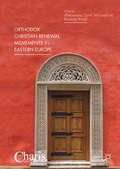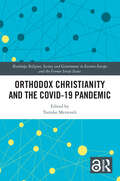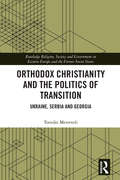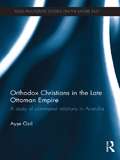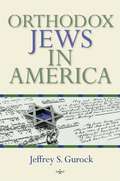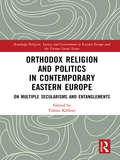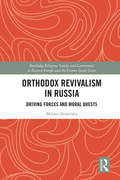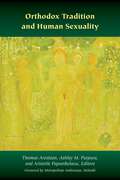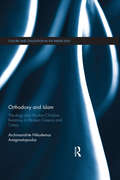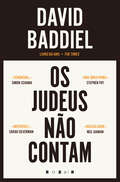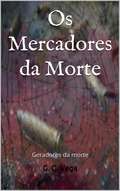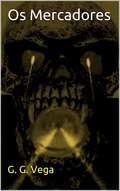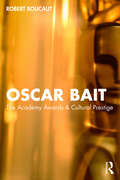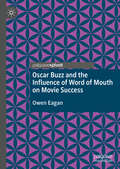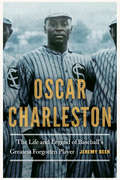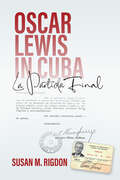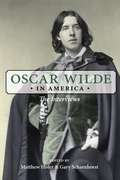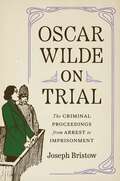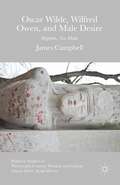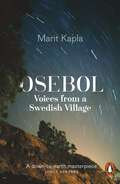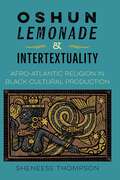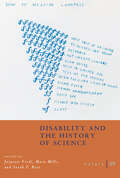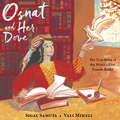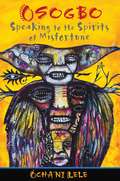- Table View
- List View
Orthodox Christian Renewal Movements in Eastern Europe
by Aleksandra Djurić Milovanović Radmila RadićThis book explores the changes underwent by the Orthodox Churches of Eastern and Southeastern Europe as they came into contact with modernity. The movements of religious renewal among Orthodox believers appeared almost simultaneously in different areas of Eastern Europe at the end of the nineteenth and during the first decades of the twentieth century. This volume examines what could be defined as renewal movement in Eastern Orthodox traditions. Some case studies include the God Worshippers in Serbia, religious fraternities in Bulgaria, the Zoe movement in Greece, the evangelical movement among Romanian Orthodox believers known as Oastea Domnului (The Lord's Army), the Doukhobors in Russia, and the Maliovantsy in Ukraine. This volume provides a new understanding of processes of change in the spiritual landscape of Orthodox Christianity and various influences such as other non-Orthodox traditions, charismatic leaders, new religious practices and rituals.
Orthodox Christianity and the COVID-19 Pandemic (Routledge Religion, Society and Government in Eastern Europe and the Former Soviet States)
by Tornike MetreveliThis book probes into the dynamics between Orthodox Christianity and the COVID-19 pandemic, unraveling a profound transformation at institutional and grassroots levels. Employing a multidisciplinary approach, and drawing upon varied data sources, including surveys, digital ethnography, and process tracing, it presents unprecedented insights into church-state relations, religious practices, and theological traditions during this crisis. Chapters analyze divergent responses across countries, underscore religious-political interplay, and expose tensions between formal and informal power networks. Through case studies, the book highlights the innovative adaptability within the faith, demonstrated by new religious practices and the active role of local priests in responding to the pandemic. It critically examines how the actions of religious and political figures influenced public health outcomes. Offering a fresh perspective, the book suggests that the pandemic may have permanently influenced the relationship between Orthodox Christianity, public health, and society.
Orthodox Christianity and the Politics of Transition: Ukraine, Serbia and Georgia (Routledge Religion, Society and Government in Eastern Europe and the Former Soviet States)
by Tornike MetreveliThis book discusses in detail how Orthodox Christianity was involved in and influenced political transition in Ukraine, Serbia, and Georgia after the collapse of communism. Based on original research, including extensive interviews with clergy and parishioners as well as historical, legal, and policy analysis, the book argues that the nature of the involvement of churches in post-communist politics depended on whether the interests of the church (for example, in education, the legal system or economic activity) were accommodated or threatened: if accommodated, churches confined themselves to the sacred domain; if threatened, they engaged in daily politics. If churches competed with each other for organizational interests, they evoked the support of nationalism while remaining within the religious domain.
Orthodox Christians in the Late Ottoman Empire: A Study of Communal Relations in Anatolia (SOAS/Routledge Studies on the Middle East)
by Ayse OzilOrthodox Christians, as well as other non-Muslims of the Ottoman Empire, have long been treated as insular and homogenous entities, distinctly different and separate from the rest of the Ottoman world. Despite this view prevailing in mainstream historiography, some scholars have suggested recently that non-Muslim life was not as monolithic and rigid as is often supposed. In an endeavour to understand the ties among Christians within the administrative, social and economic structures of the imperial and Orthodox Christian worlds, Ayşe Ozil engages in a rarely undertaken comparative analysis of Ottoman, Greek and European archival sources. Using the hitherto under-explored region of Hüdavendigar in the heartland of the empire as a case study, she questions commonplace assumptions about the meaning of ethno-religious community within a Middle Eastern imperial framework. Offering a more nuanced investigation of Ottoman Christians by connecting Ottoman and Greek history, which are often treated in isolation from one another, this work sheds new light on communal existence.
Orthodox Jews in America
by Jeffrey S. GurockAlthough there are many good books on the history of Jews in America and a smaller subset that focuses on aspects of Orthodox Judaism in contemporary times, no one, until now, has written an overview of how Orthodoxy in America has evolved over the centuries from the first arrivals in the 17th century to the present. This broad overview by Gurock (Libby M. Klaperman Professor of Jewish History, Yeshiva Univ. ; Judaism's Encounter with American Sports) is distinctive in examining how Orthodox Jews have coped with the personal, familial, and communal challenges of religious freedom, economic opportunity, and social integration, as well as uncovering historical reactionary tensions to alternative Jewish movements in multicultural and pluralistic America. Gurock raises penetrating questions about the compatibility of modern culture with pious practices and sensitively explores the relationship of feminism to traditional Orthodox Judaism. There are several excellent reference sources on Orthodox Jews in America, e. g. , Rabbi Moshe D. Sherman's outstanding Orthodox Judaism in America: A Biographical Dictionary and Source book, to which this is an accessible and illuminating companion; recommended not only for serious readers on the topic but for general readers as well.
Orthodox Religion and Politics in Contemporary Eastern Europe: On Multiple Secularisms and Entanglements (Routledge Religion, Society and Government in Eastern Europe and the Former Soviet States)
by Tobias KoellnerThis book explores the relationship between Orthodox religion and politics in Eastern Europe, Russia and Georgia. It demonstrates how as these societies undergo substantial transformation Orthodox religion can be both a limiting and an enabling factor, how the relationship between religion and politics is complex, and how the spheres of religion and politics complement, reinforce, influence, and sometimes contradict each other. Considering a range of thematic issues, with examples from a wide range of countries with significant Orthodox religious groups, and setting the present situation in its full historical context the book provides a rich picture of a subject which has been too often oversimplified.
Orthodox Revivalism in Russia: Driving Forces and Moral Quests (Routledge Religion, Society and Government in Eastern Europe and the Former Soviet States)
by Milena BenovskaOrthodoxy has achieved a large scale revival in Russia following the collapse of Communism. However, paradoxically, although there is a high level of identification with Orthodoxy, there is in fact a low level of church attendance. This book, based on in depth ethnographic fieldwork, explores the social background and moral attitudes of the "little flock" of believers who actively participate in religious life. It reveals that the complex moral beliefs of the faithful have a disproportionately high impact on Russian society overall; that among the faithful there is a strong emphasis on striving for personal perfection; but that also there are strong collective ideas concerning religious nationalism and the synergy between the secular and the religious.
Orthodox Tradition and Human Sexuality (Orthodox Christianity and Contemporary Thought)
by Thomas Arentzen, Ashley M. Purpura, and Aristotle PapanikolaouSex is a difficult issue for contemporary Christians, but the past decade has witnessed a newfound openness regarding the topic among Eastern Orthodox Christians. Both the theological trajectory and the historical circumstances of the Orthodox Church differ radically from those of other Christian denominations that have already developed robust and creative reflections on sexuality and sexual diversity. Within its unique history, theology, and tradition, Orthodox Christianity holds rich resources for engaging challenging questions of sexuality in new and responsive ways. What is at stake in questions of sexuality in the Orthodox tradition? What sources and theological convictions can uniquely shape Orthodox understandings of sexuality? This volume aims to create an agora for discussing sex, and not least the sexualities that are often thought of as untraditional in Orthodox contexts.Through fifteen distinct chapters, written by leading scholars and theologians, this book offers a developed treatment of sexuality in the Orthodox Christian world by approaching the subject from scriptural, patristic, theological, historical, and sociological perspectives. Chapters devoted to practical and pastoral insights, as well as reflections on specific cultural contexts, engage the human realities of sexual diversity and Christian life. From re-thinking scripture to developing theologies of sex, from eschatological views of eros to re-evaluations of the Orthodox responses to science, this book offers new thinking on pressing, present-day issues and initiates conversations about homosexuality and sexual diversity within Orthodox Christianity.
Orthodoxy and Islam: Theology and Muslim–Christian Relations in Modern Greece and Turkey (Culture and Civilization in the Middle East)
by Archimandrite Nikodemos AnagnostopoulosChurch History reveals that Christianity has its roots in Palestine during the first century and was spread throughout the Mediterranean countries by the Apostles. However, despite sharing the same ancestry, Muslims and Christians have been living in a challenging symbiotic co-existence for more than fourteen centuries in many parts of South-Eastern Europe and the Middle East. This book analyses contemporary Christian-Muslim relations in the traditional lands of Orthodoxy and Islam. In particular, it examines the development of Eastern Orthodox ecclesiological thinking on Muslim-Christian relations and religious minorities in the context of modern Greece and Turkey. Greece, where the prevailing religion is Eastern Orthodoxy, accommodates an official recognised Muslim minority based in Western Thrace as well as other Muslim populations located at major Greek urban centres and the islands of the Aegean Sea. On the other hand, Turkey, where the Ecumenical Patriarchate of Constantinople is based, is a Muslim country which accommodates within its borders an official recognised Greek Orthodox Minority. The book then suggests ways in which to overcome the difficulties that Muslim and Christian communities are still facing with the Turkish and Greek States. Finally, it proposes that the positive aspects of the coexistence between Muslims and Christians in Western Thrace and Istanbul might constitute an original model that should be adopted in other EU and Middle East countries, where challenges and obstacles between Muslim and Christian communities still persist. This book offers a distinct and useful contribution to the ever popular subject of Christian-Muslim relations, especially in South-East Europe and the Middle East. It will be a key resource for students and scholars of Religious Studies and Middle Eastern Studies.
Os Judeus Não Contam: Como as Políticas Identitárias Deixaram Ficar Mal uma Identidade em Particular
by David BaddielComo as políticas identitárias falharam com uma identidade em particular Vivemos num momento de intensa consciencialização sobre as minorias, em que pessoas que consideram estar do lado certo da História lutam ativamente contra formas de discriminação como a homofobia, a deficiência, a transfobia e, sobretudo, o racismo. David Baddiel defende, porém, que há um tipo de racismo que tem sido deixado de fora dessa luta: o antissemitismo. Neste livro, numa brilhante combinação de observações perspicazes, experiências pessoais e críticas acutilantes, o famoso comediante e escritor apresenta a sua perspetiva sobre como as políticas identitárias e não discriminatórias têm falhado com uma identidade em particular e descreve como os judeus não contam como uma verdadeira minoria - e por que motivo deveriam contar. Um pequeno ensaio sociopolítico que convida a uma reflexão sobre a desigualdade no tratamento das minorias. «Uma crítica convincente e devastadora.» The Sunday Times
Os Mercadores da Morte.
by Guido Galeano Vega Elizani B.Neste livro: Os Mercadores, não é minha intenção julgar determinados grupos de pessoas, envolvidas na comercialização de equipamento militar, e comercialização de violência no mundo, mas se você pretende ajudá-lo a entender que não é o caminho certo para o mundo, para as sociedades humanas e para toda a vida no planeta. Esses sistemas nos empurram de maneira acelerada para repetir os mesmos erros do passado, quando destruímos muito do que tanto sacrifício significou para construí-lo e, literalmente, mais de 60 milhões de pessoas foram eliminadas em um tempo muito curto. A guerra é a invenção mais irracional do planeta, da raça humana. Espero que este livro ajude o planeta a considerar um caminho diferente, que não esteja nós levando inevitavelmente a repetir os erros do passado, mas em uma proporção totalmente irracional e diabólica.
Os Mercadores: Geradores Da Morte
by G. G. Vega Álvaro Tavares de OliveiraOs Mercadores é um livro que se foca no grave problema global da tirania dos mercadores da morte. Neste século passado, como em nenhum outro anteriormente, a humanidade sofreu as consequências fatais e desastrosas jamais imaginadas nem esperadas da gigantesca maquinaria bélica e suas vítimas, na maioria dos casos, pessoas inocentes. Precisamos tomar consciência do que somos e para que realmente existimos, como indivíduos e como sociedade. Leia-o e você sentirá que toda uma geração foi vítima da indústria da guerra. Vivemos, neste sentido, em uma etapa crítica como nunca. O planeta está minado de material bélico e o pior é que muito dele é material bélico nuclear. Cada pessoa tem direito de aprovar ou reprovar este tipo de indústria bélica e não convém a ninguém neste planeta tão grande poder destrutivo. Estamos em uma geração onde qualquer conflito pode ser a chispa de uma guerra termonuclear de destruição massiva. Não é exagerado preocupar-se e é criminoso não perceber a gravidade desta situação.
Oscar Bait: The Academy Awards & Cultural Prestige (Routledge Advances in Film Studies)
by Robert BoucautThe Academy Awards – or "the Oscars" – have held a unique position in defining and enacting "prestige" for film industries and their publics. In evaluating ‘the best’ of film, they wield cultural influence over such cinema practices as consumption and evaluation, filmmaking aesthetics and narratives, and the discursive activity of Hollywood’s industrial agents and audiences. Oscar Bait: The Academy Awards & Cultural Prestige offers a comprehensive insight into how a film or star positions one’s self as a viable competitor worthy of such consecration in new media contexts.Based over three years of ‘Oscars seasons’ (2019–2021), rigorous analysis of film texts, awards telecasts, and circulating discursive media is built through an original scholarly framework for understanding modern cultural awards. Oscar Bait recontextualises the Oscars’ complex legacy into a new media ecosystem, one in which their established value is undercut by declining broadcast viewership, the changing values and demands of global film publics, and influential discourses aiming to progress popular culture beyond its problematic histories. In this new paradigm of film production and consumption, Boucaut explores what the Oscars mean in a contemporary filmmaking landscape and what impacts established stereotypes of Oscar-worthiness – the colloquial ‘Oscar Bait’ – continue to hold over the awards.Oscar Bait captures a dynamic snapshot of the Oscars and Hollywood in a critical era. It advances popular culture scholarship by developing an analytical framework for understanding disparate media texts within an awards season – and it critically updates Oscars knowledges for modern contexts. Readers interested in media and cultural studies, celebrity studies, persona studies, popular culture, and film will enjoy this book.
Oscar Buzz and the Influence of Word of Mouth on Movie Success
by Owen EaganThis book explores why word of mouth is the most important determinant of a movie’s success. Beginning with a discussion of the enduring appeal of movies, and why the box office has survived the disruption of television and will likely survive the disruption of streaming services, Owen Eagan goes on to discuss the unpredictable nature of movies and ways to mitigate their risk. His astute analysis sheds light on the role of film festivals, film critics, Oscar campaigns, and word of mouth in influencing a film's success. Eagan concludes with a summary of why word of mouth is the most influential among all the variables that affect a film’s outcome. Expertly synthesizing quantitative analyses of box office data with illuminating insights from industry experts, this concise and engaging book presents findings with important implications for scholars, industry insiders and marketing professionals alike.
Oscar Charleston: The Life and Legend of Baseball's Greatest Forgotten Player
by Jeremy BeerBuck O&’Neil once described him as &“Ty Cobb, Babe Ruth, and Tris Speaker rolled into one.&” Among experts he is regarded as the best player in Negro Leagues history. During his prime he became a legend in Cuba and one of black America&’s most popular figures. Yet even among serious sports fans, Oscar Charleston is virtually unknown today. In a long career spanning from 1915 to 1954, Charleston played against, managed, befriended, and occasionally fought men such as Lou Gehrig, Jimmie Foxx, Lefty Grove, Satchel Paige, Josh Gibson, Jesse Owens, Roy Campanella, and Branch Rickey. He displayed tremendous power, speed, and defensive instincts along with a fierce intelligence and commitment to his craft. Charleston&’s competitive fire sometimes brought him trouble, but more often it led to victories, championships, and profound respect. While Charleston never played in the Major Leagues, he was a trailblazer who became the first black man to work as a scout for a Major League team when Branch Rickey hired him to evaluate players for the Dodgers in the 1940s. From the mid‑1920s on, he was a player‑manager for several clubs. In 1932 he joined the Pittsburgh Crawfords and would manage the club many consider the finest Negro League team of all time, featuring five future Hall of Famers, including himself, Cool Papa Bell, Josh Gibson, Judy Johnson, and Satchel Paige. Charleston&’s combined record as a player, manager, and scout makes him the most accomplished figure in black baseball history. His mastery of the quintessentially American sport under the conditions of segregation revealed what was possible for black achievement, bringing hope to millions. Oscar Charleston introduces readers to one of America&’s greatest and most fascinating athletes.
Oscar Lewis in Cuba: La Partida Final
by Susan M. RigdonAmerican anthropologist Oscar Lewis secured permission from Fidel Castro to undertake three years of field research on cultural and economic change in Cuba in the decade after the victory of Castro’s M-26 Movement. This book delves into Lewis’ research goals, methods, the training and composition of his field team, and the difficulties of executing the plan in the political climate in Cuba at the time. The government’s reasons for early termination of the research agreement are enumerated and their many discrepancies and inconsistencies evaluated. The experience of Project Cuba offers lessons on the difficulties of doing social science research in any highly surveilled, politically controlled environment however sympathetic the principal investigator.
Oscar Wilde in America: The Interviews
by Oscar Wilde Gary Scharnhorst Matthew HoferBetter known in 1882 as a cultural icon than a serious writer, Oscar Wilde was brought to North America for a major lecture tour on Aestheticism and the decorative arts. With characteristic aplomb, he adopted the role as the ambassador of Aestheticism, and he tried out a number of phrases, ideas, and strategies that ultimately made him famous as a novelist and playwright. This exceptional volume cites all ninety-one of Wilde's interviews and contains transcripts of forty-eight of them, and it also includes his lecture on his travels in America.
Oscar Wilde on Trial: The Criminal Proceedings, from Arrest to Imprisonment (Yale Law Library Series in Legal History and Reference)
by Joseph BristowThe most authoritative account of a pivotal event in legal and cultural history: the trials of Oscar Wilde on charges of &“gross indecency&” Among the most infamous prosecutions of a literary figure in history, the two trials of Oscar Wilde for committing acts of &“gross indecency&” occurred at the height of his fame. After being found guilty, Wilde spent two years in prison, emerged bankrupt, and died in a cheap hotel room in Paris a few years after his release. The trials prompted a new intolerance toward homosexuality: habits of male bonding that were previously seen as innocent were now viewed as a threat, and an association grew in the public mind between gay men and the arts.Oscar Wilde on Trial assembles accounts from a variety of sources, including official and private letters, newspaper accounts, and previously published (but very incomplete) transcripts, to provide the most accurate and authoritative account to date of events that were pivotal in both legal and cultural history.
Oscar Wilde, Wilfred Owen, and Male Desire: Begotten, Not Made (Palgrave Studies in Nineteenth-Century Writing and Culture)
by James CampbellThis book reads Oscar Wilde as a queer theorist and Wilfred Owen as his symbolic son. It centers on the concept of 'male procreation', or the generation of new ideas through an erotic but non-physical connection between two men, and it sees Owen as both a product and a continuation of this Wildean tradition.
Osceola: Memories of a Sharecropper's Daughter
by Alan Govenar Shane W. Evans Osceola MaysOsceola Mays was born in East Texas in 1909, the daughter of a sharecropper and the granddaughter of slaves. She survives fear, poverty, and the loss of loved ones by recalling memories of her childhood, and the stories, songs, and poems she learned from her mother and grandmother. Like a patchwork quilt, this collection pieces together Osceola's life into a vivid and profound mosaic. Osceola is a poignant and powerful oral history, a collection that will touch readers' hearts as it informs them of the legacy of slavery and the past conditions of African Americans in the South.
Osebol: Voices from a Swedish Village
by Marit KaplaA SUNDAY TELEGRAPH AND GUARDIAN BOOK OF THE YEARWINNER OF SWEDEN'S AUGUST PRIZEWINNER OF THE WARWICK PRIZE FOR WOMEN IN TRANSLATIONSHORTLISTED FOR THE BRITISH ACADEMY BOOK PRIZE'Osebol is a magnificent success; it is hard to imagine it better ... Kapla is a magician ... mesmerizing' Sara Wheeler, TLS'A simple, pared-back and down-to-earth masterpiece' James Rebanks'We listen to them like something caught on the wind ... so moving and so strangely beckoning' Nicci Gerrard, Observer'[Among] the year's most pleasing books' Rishi Dastidar, Guardian, Books of the Year'Engrossing and humbling and quietly revelatory' Max Porter'Fascinating ... I was riveted' Lydia Davis'Like standing outside an open window on a warm summer evening and listening to a piece of contemporary history' Länstidningen'What a wonderful book . . . You want to move into it' ExpressenNear the river Klarälven, snug in the dense forest landscape of northern Värmland, lies the secluded village of Osebol. It is a quiet place: one where relationships take root over decades, and where the bustle of city life is replaced by the sound of wind in the trees.In this extraordinary and engrossing book, an unexpected cultural phenomenon in its native Sweden, the stories of Osebol's residents are brought to life in their own words. Over the last half-century, the automation of the lumber industry and the steady relocations to the cities have seen the village's adult population fall to roughly forty. But still, life goes on; heirlooms are passed from hand to hand, and memories from mouth to mouth, while new arrivals come from near and far.Marit Kapla has interviewed nearly every villager between the ages of 18 and 92, recording their stories verbatim. What emerges is at once a familiar chronicle of great social metamorphosis, told from the inside, and a beautifully microcosmic portrait of a place and its people. To read Osebol is to lose oneself in its gentle rhythms of simple language and open space, and to emerge feeling like one has really grown to know the inhabitants of this varied community, nestled among the trees in a changing world.
Oshun, Lemonade, and Intertextuality: Afro-Atlantic Religion in Black Cultural Production
by Sheneese ThompsonExploring how Afro-Atlantic religion has been used to portray Black womanhood by writers and artists from Beyoncé to Ntozake Shange In this book, Sheneese Thompson analyzes works of film and literature to explore how Afro-Atlantic religion intersects with themes of resilience in Black femininity and womanhood. Focusing on Beyoncé’s visual album Lemonade, Thompson examines iconography of the Yoruba goddess Oshun, represented by rivers, the color yellow, and other symbols. Thompson argues that Beyoncé’s tribute to Oshun creates a narrative of self-repossession amid external definitions, generational trauma, and emotional violence and draws connections to other works that feature similar religious references. Oshun, “Lemonade,” and Intertextuality also explores Beyoncé’s album Black Is King, the television series She’s Gotta Have It, Julie Dash’s movie Daughters of the Dust, Ntozake Shange’s novel Sassafrass, Cypress & Indigo, and Jamaica Kincaid’s stories in At the Bottom of the River. These works highlight the significance of African traditional religions for the healing and transformation of their characters. Thompson discusses the ways in which Yoruba and Lucumí imagery and practices such as oríkì, or praise poetry, have long been incorporated into Black cultural texts such as these to tell stories of racial and gender-based injustices. In looking at Lemonade together with influential older texts created by Black women, Thompson establishes the use of Afro-Atlantic religion—to think through Black womanhood, to explore self-defined sexuality—as a central tenet of Black women’s literature, one that these artists and writers have brought to the global stage. Publication of this work made possible by a Sustaining the Humanities through the American Rescue Plan grant from the National Endowment for the Humanities.
Osiris, Volume 39: Disability and the History of Science (Osiris #39)
by The University of Chicago PressPresents a powerful new vision of the history of science through the lens of disability studies. Disability has been a central—if unacknowledged—force in the history of science, as in the scientific disciplines. Across historical epistemology and laboratory research, disability has been “good to think with”: an object of investigation made to yield generalizable truths. Yet disability is rarely imagined to be the source of expertise, especially the kind of expertise that produces (rational, neutral, universal) scientific knowledge. This volume of Osiris places disability history and the history of science in conversation to foreground disability epistemologies, disabled scientists, and disability sciencing (engagement with scientific tools and processes). Looking beyond paradigms of medicalization and industrialization, the volume authors also examine knowledge production about disability from the ancient world to the present in fields ranging from mathematics to the social sciences, resulting in groundbreaking histories of taken-for-granted terms such as impairment, infirmity, epidemics, and shōgai. Some contributors trace the disabling impacts of scientific theories and practices in the contexts of war, factory labor, insurance, and colonialism; others excavate racial and settler ableism in the history of scientific facts, protocols, and collections; still others query the boundaries between scientific, lay, and disability expertise. Contending that disability alters method, authors bring new sources and interpretation techniques to the history of science, overturn familiar narratives, apply disability analyses to established terms and archives, and discuss accessibility issues for disabled historians. The resulting volume announces a disability history of science.
Osnat and Her Dove: The True Story of the World's First Female Rabbi
by Sigal SamuelOsnat was born five hundred years ago – at a time when almost everyone believed in miracles. But very few believed that girls should learn to read.Yet Osnat's father was a great scholar whose house was filled with books. And she convinced him to teach her. Then she in turn grew up to teach others, becoming a wise scholar in her own right, the world's first female rabbi!Some say Osnat performed miracles – like healing a dove who had been shot by a hunter! Or saving a congregation from fire!But perhaps her greatest feat was to be a light of inspiration for other girls and boys; to show that any person who can learn might find a path that none have walked before.
Osogbo: Speaking to the Spirits of Misfortune
by Ócha'Ni LeleBy understanding osogbo, the spirits of misfortune, we can better overcome them and return to health and balance in our lives • Explains how misfortune works in this world as living spirits that plague humanity but are also a catalyst for self-development and conscious evolution • Shows that we can overcome osogbo through ebó, sacrifice, and hard work as prescribed by consulting the orishas through the casting of the diloggún • Shares more than 40 ancient African sacred stories about the spirits of osogbo Beginning with the story of his goddaughter's battle with stage IV cancer, Lucumi priest Ócha'ni Lele explains the role of osogbo, or misfortune, in our lives. While everyone seeks blessings in life, undeserved blessings make us weak and lazy. It is tragedy that encourages us to grow and persevere. Exploring the Lucumí beliefs regarding osogbo, he shows that the Lucumí faith is neither fatalistic nor defeatist but healing and life affirming. He shares more than 40 patakís--stories stemming from the ancient Yoruba of West Africa--about the different spirits of osogbo, who like the orishas once walked the earth in human bodies. He explains the place of these spirits within the 256 odu of the diloggún, the divination system used in Santería to receive guidance from the orishas. Lele shows that the spirits of osogbo are not only concepts but also real deities and that we can, if we understand their nature, fight them through ebó, sacrifice, and hard work. He reveals how the osogbos see themselves as entities of misfortune who stand against life and all that is good in the world, but in truth it is misfortune that strengthens us, misfortune that motivates us, and misfortune that brings great evolution to the world. As the author shows, “Without bitterness, one could not know sweetness.” Likewise, without misfortune in our lives, we would never know blessings or what it means to be blessed.
